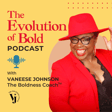
Ep 05 From Exhaustion to Empowerment: How Boundaries Can Transform Your Life
In this uplifting episode, we dive deep into the life-changing importance of saying "no" without guilt, setting emotional boundaries in relationships, and prioritizing self-care. ✨ Join me, Vaneese Johnson, the Boldness Coach(tm) as we uncover how boundaries can transform your life, helping you live BOLDLY and without permission!
Feel the power of your own voice 🔥 as we explore ways to prioritize self-care, negotiate wisely, and hold firm to what matters most to you. And remember, it's all about living that BOLD, audacious life—no permission needed!
Tune in, get inspired, and let's evolve BOLDLY! 🌟
Ready to set those vital boundaries and step into your BOLDness? If you need personalized guidance, don't hesitate to reach out for Boldness Coaching with me, Vaneese Johnson at https://hello.dubsado.com/public/form/view/62e32bc50b571daea26eb008
Let's get you from Exhaustion to Empowerment together!
